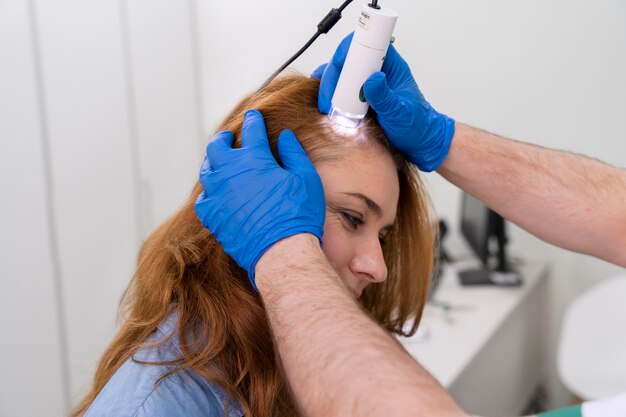Introduction
Hair loss can be frustrating. It affects confidence, self-image, and how people feel about themselves. Best PRP Hair Treatment in Islamabad, Pakistan PRP (Platelet-Rich Plasma) therapy has become popular for restoring hair naturally. It uses your blood to stimulate hair growth—no surgery or chemicals, just your body’s natural healing process at work.
Since it’s a medical procedure, it’s not entirely risk-free. While most people tolerate it well, some side effects can happen. Knowing what to expect can help you feel more prepared.
At Dr. Taskeen Iqbal’s clinic, we specialise in PRP hair treatment in Islamabad, focusing on safety and natural-looking results. Let’s look at the side effects, how long they last, and what you can do to minimise them.
What Is PRP Hair Treatment?
PRP therapy sounds high-tech, but it’s pretty simple. Here’s how it works:
- Blood Draw: A small amount of blood is taken from your arm like a routine blood test.
- Plasma Separation: The blood is spun in a machine (a centrifuge) to separate the PRP, which is packed with growth factors.
- Scalp Injection: The PRP is injected into areas where hair is thinning to stimulate growth.
Because PRP comes from your own body, allergic reactions are rare. However, like any procedure, there are possible side effects.
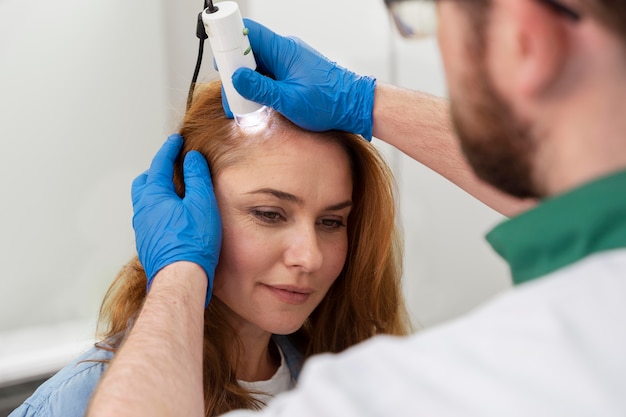
Is PRP a Safe Treatment?
PRP is considered safe because it doesn’t involve foreign substances or surgery. PRP Hair Treatment Success Rate: Does It Work? Your body recognizes its plasma, reducing the risk of significant complications. The key to safety, though, is how the procedure is performed, ensuring the best results naturally.
Dr. Taskeen Iqbal’s clinic follows strict hygiene standards and uses advanced techniques to minimise side effects. While some discomfort is expected, serious issues are rare when done correctly.
Common Side Effects of PRP Hair Treatment
Most people experience mild, short-term effects. Here’s what you might notice:
1. Temporary Pain or Discomfort
PRP involves injections, so some pain is normal. It’s often described as a mild stinging or pressure during the procedure. Any discomfort usually fades within a few hours to a day.
2. Redness and Swelling
The scalp may look slightly red or swollen right after treatment. This is just your body reacting to the injections. It typically settles within 24 to 48 hours.
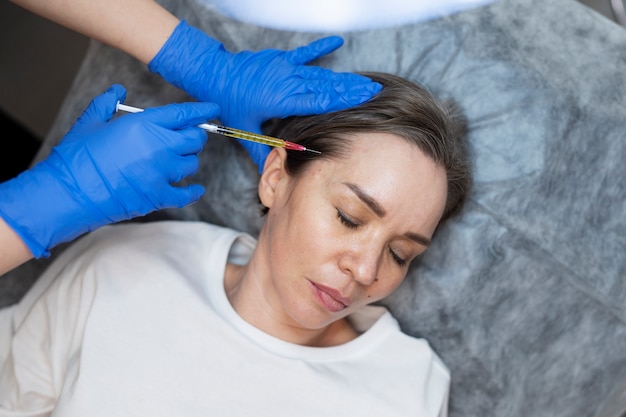
3. Bruising at Injection Sites
Some people notice minor bruises, especially if they have sensitive skin or bruise easily. This happens when tiny blood vessels are affected during the procedure. The bruising fades on its own within a week.
4. Scalp Tenderness
It’s common to feel a minor soreness when the injections are done. Your scalp might be sensitive for a day or two, especially when you touch it.
5. Itching
Some people feel mild itching as their scalp heals. This can happen because of increased blood flow in the area. Washing with a gentle, sulfate-free shampoo after 24 hours can help.
6. Mild Headaches
A headache isn’t unusual after PRP, mainly if multiple injections are used. Staying hydrated and resting can help ease any discomfort.
Less Common Side Effects
While PRP is generally well-tolerated, some people may experience less common effects:
1. Infection (Rare but Possible)
Since PRP involves injections, there’s a small risk of infection if bacteria enter the skin. Symptoms include excessive redness, swelling, or pus. We use sterile techniques at Dr. Taskeen Iqbal’s clinic to minimise this risk.
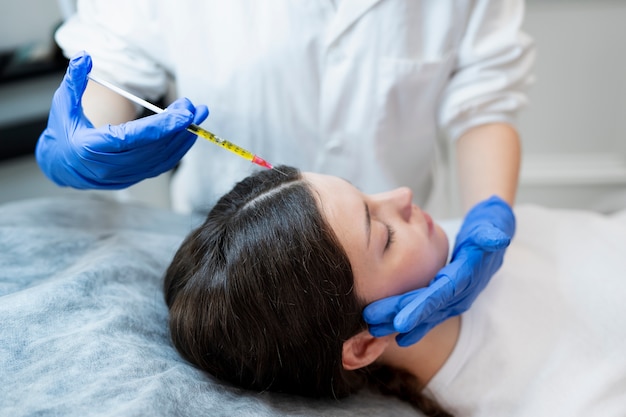
2. Dizziness or Lightheadedness
Some people feel lightheaded after PRP, especially if they haven’t eaten beforehand. Eating a small meal before treatment can help prevent this.
3. Blood Clotting Issues
PRP depends on platelets, which help with clotting. If you have a blood disorder or take blood thinners, PRP may not be the best option. Talk to your doctor before the procedure.
4. Allergic Reactions (Extremely Rare)
PRP is from your blood, so allergies are unlikely. However, some people may have sensitivities if numbing cream or other substances are used. Let your doctor know if you have a history of allergies.
How to Reduce Side Effects
A few simple steps can help you heal faster and feel more comfortable after PRP treatment:
- Don’t touch your scalp for at least 48 hours. Scratching or rubbing can irritate the area.
- Drink plenty of water to help your body heal.
- Use a mild shampoo after 24 hours to keep your scalp clean.
- Skip heavy exercise or sweating for two days to avoid irritation.
- Avoid alcohol and smoking for a few days, as they can slow healing.
By following these tips, you’ll have a smoother recovery.
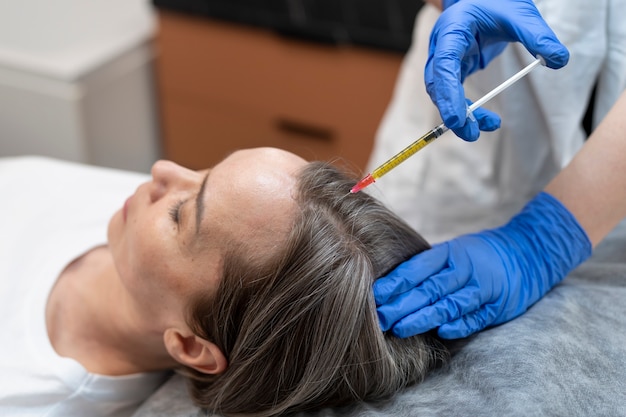
Who Shouldn’t Get PRP?
While PRP is safe for most people, it’s not recommended if you have:
- Low platelet counts or a blood clotting disorder.
- Chronic illnesses like diabetes or liver disease.
- Scalp infections or active skin conditions.
- A history of poor wound healing.
- Pregnancy or breastfeeding.
If unsure, talk to a doctor to see if PRP is right for you.
When to Call Your Doctor
Most side effects go away on their own, but there are times when you should seek medical help. Watch for:
- Severe pain lasting more than two days.
- Signs of infection, like excessive swelling, redness, or pus.
- Fever or ongoing dizziness.
If anything feels off, don’t ignore it. Your doctor can check if everything is healing correctly.
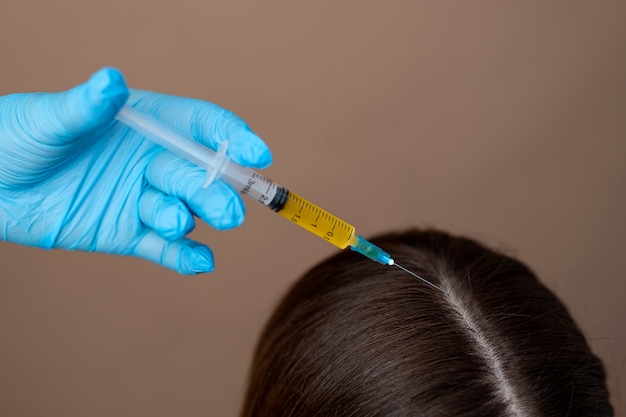
Is PRP Worth It?
Many people find PRP to be a significant investment in their hair health. It’s a natural, safe, and effective treatment for hair loss. Since the side effects are usually mild and short-lived, most patients feel the benefits outweigh the temporary discomfort.
Results take time, but those who complete the recommended sessions often see real improvements in hair growth and scalp health. Suppose you’re considering PRP hair treatment in Islamabad. In that case, Dr. Taskeen Iqbal’s clinic offers expert care focusing on safety and results. A consultation can help you decide if PRP is the right choice.
Final Thoughts
PRP hair treatment is an exciting option for people struggling with hair loss. It’s simple, natural, and non-surgical. While minor side effects like redness and tenderness are typical, serious complications are rare.
Knowing what to expect makes the process easier and less stressful. If you’re thinking about PRP, finding a skilled provider is key. At Dr. Taskeen Iqbal’s, we offer safe, professional PRP treatments and personalised care.
Hair restoration takes patience, but you can regain confidence in your hair with the proper treatment. If you’re ready to take the next step, schedule a consultation and start your journey to healthier hair today.
FAQs
Does hair PRP have side effects?
Yes, mild side effects like redness, swelling, and slight discomfort can occur. Still, they usually go away within a few days. Since PRP uses your blood, allergic reactions are rare. We follow strict safety protocols at Dr Taskeen Iqbal’s clinic to minimise side effects.
What happens if PRP goes wrong?
If PRP is done incorrectly or in unhygienic conditions, there’s a small risk of infection, excessive swelling, or poor results. Choosing an experienced professional reduces these risks significantly. Dr. Taskeen Iqbal’s clinic ensures expert care with advanced techniques.
What are the risks of PRP?
The risks are minimal but can include minor bruising, temporary headaches, or mild scalp sensitivity. Serious complications are rare when PRP is performed correctly. With Dr. Taskeen Iqbal’s expertise, patients receive careful treatment to avoid unnecessary risks.
Is PRP for hair loss safe?
PRP is a safe and non-surgical treatment since it uses your plasma to promote hair growth. The procedure is well-tolerated by most people with little to no downtime. At Dr. Taskeen Iqbal’s clinic, patient safety and comfort are always the top priority.
Who should avoid PRP?
PRP isn’t suitable for people with blood disorders, chronic illnesses, or active scalp infections. It’s also not recommended for pregnant women or those on blood thinners. A consultation at Dr. Taskeen Iqbal’s clinic can help determine if PRP is right for you.

